Entrepreneurship and Small Business Management Report, Hong Kong
VerifiedAdded on 2022/10/01
|22
|5019
|378
Report
AI Summary
This report examines entrepreneurship and small business management within the context of Hong Kong. It begins with an abstract defining entrepreneurship and exploring different venture types, including startups, survival ventures, scalable startups, managed growth ventures, and lifestyle ventures. It then compares entrepreneurs and intrapreneurs, highlighting their distinct roles and responsibilities. The report further explores the significance of small businesses in the Hong Kong economy, emphasizing their importance and the factors influencing entrepreneurial spirit. It discusses the characteristics of successful entrepreneurs, as well as the environments that foster or hinder entrepreneurship. The report also includes an analysis of the entrepreneurial landscape in Hong Kong, including the influence of political, cultural, and social factors, and concludes with a discussion of the future of entrepreneurship in the region. The report uses the Harvard referencing system and includes a bibliography.
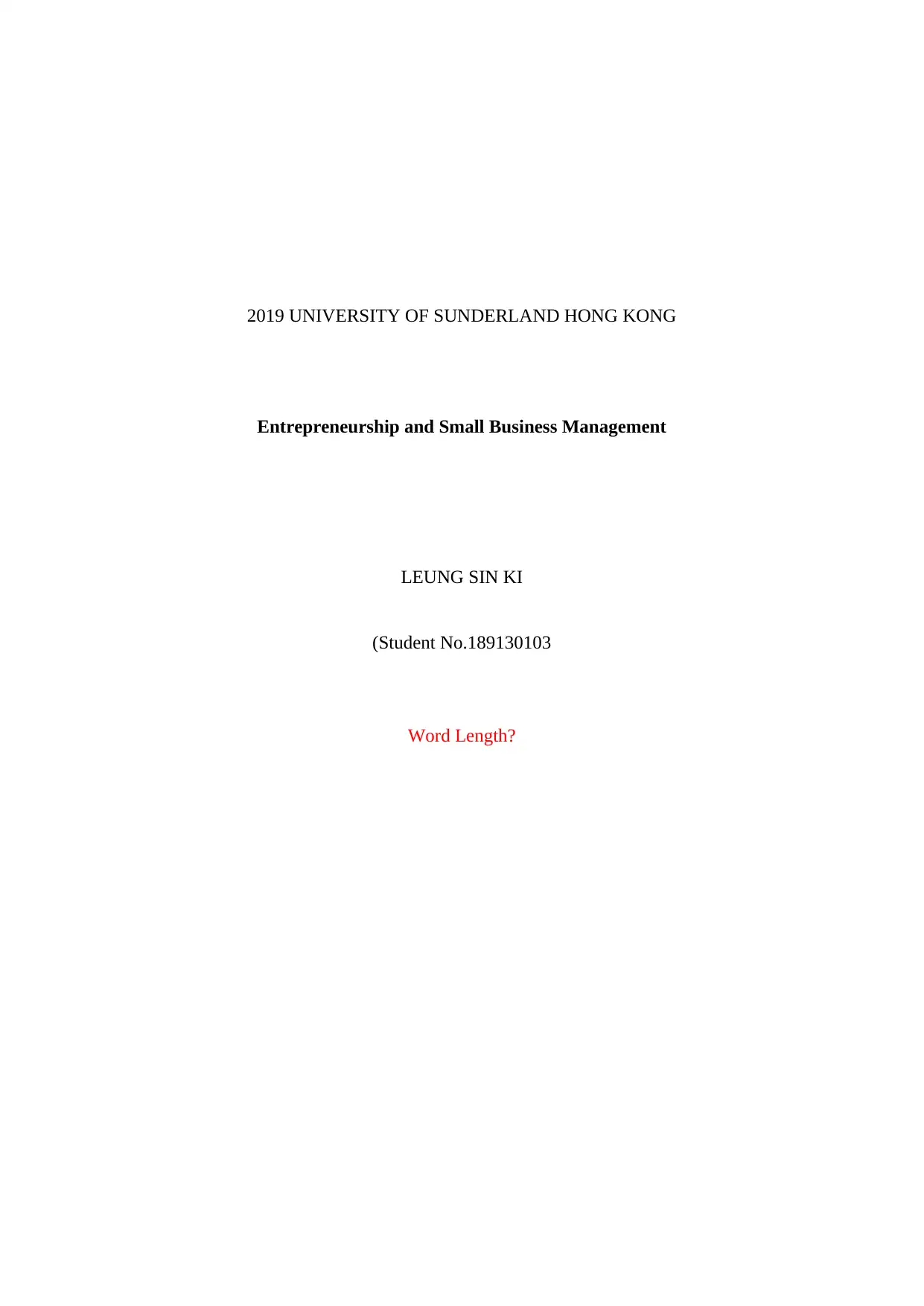
2019 UNIVERSITY OF SUNDERLAND HONG KONG
Entrepreneurship and Small Business Management
LEUNG SIN KI
(Student No.189130103
Word Length?
Entrepreneurship and Small Business Management
LEUNG SIN KI
(Student No.189130103
Word Length?
Paraphrase This Document
Need a fresh take? Get an instant paraphrase of this document with our AI Paraphraser
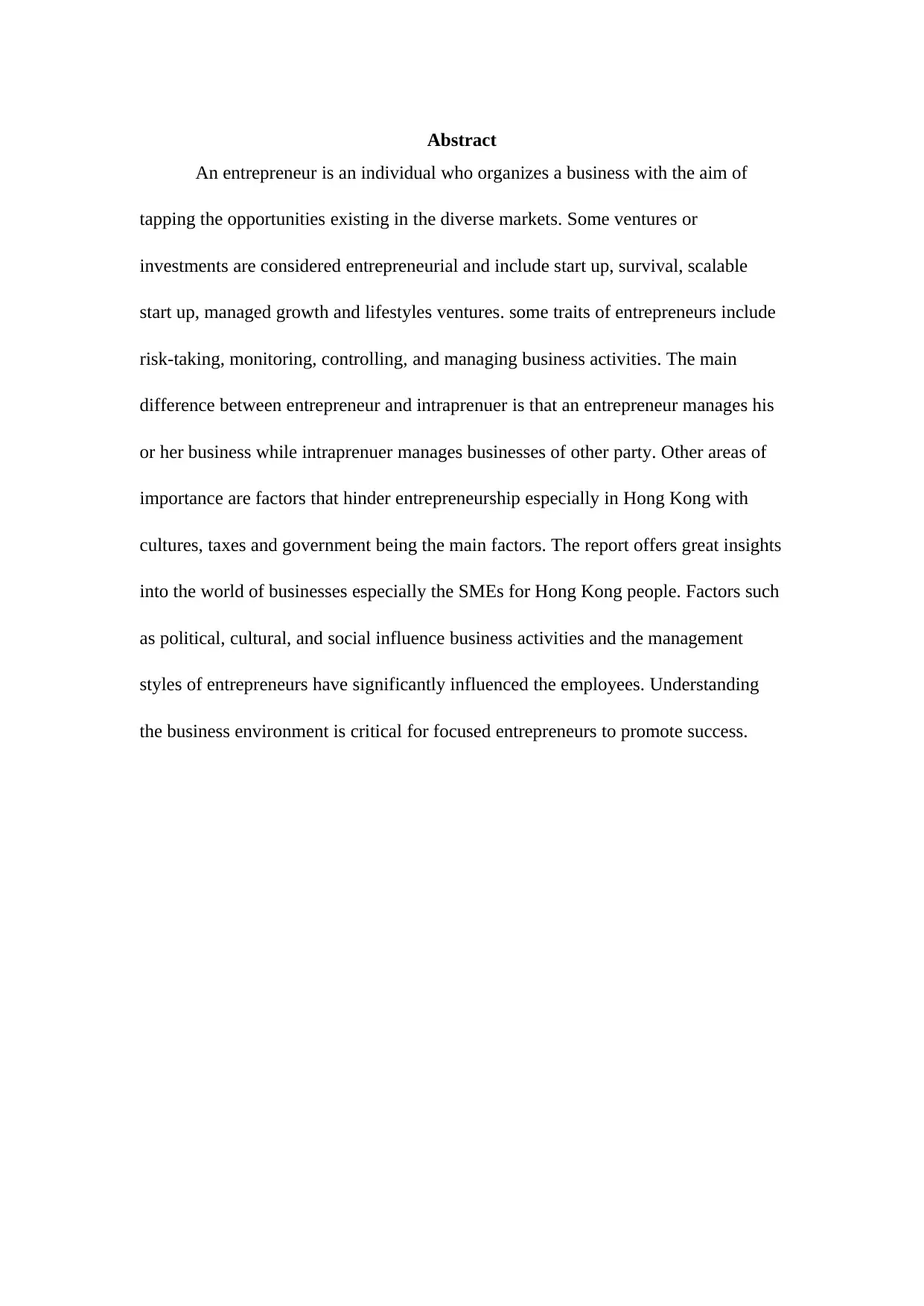
Abstract
An entrepreneur is an individual who organizes a business with the aim of
tapping the opportunities existing in the diverse markets. Some ventures or
investments are considered entrepreneurial and include start up, survival, scalable
start up, managed growth and lifestyles ventures. some traits of entrepreneurs include
risk-taking, monitoring, controlling, and managing business activities. The main
difference between entrepreneur and intraprenuer is that an entrepreneur manages his
or her business while intraprenuer manages businesses of other party. Other areas of
importance are factors that hinder entrepreneurship especially in Hong Kong with
cultures, taxes and government being the main factors. The report offers great insights
into the world of businesses especially the SMEs for Hong Kong people. Factors such
as political, cultural, and social influence business activities and the management
styles of entrepreneurs have significantly influenced the employees. Understanding
the business environment is critical for focused entrepreneurs to promote success.
An entrepreneur is an individual who organizes a business with the aim of
tapping the opportunities existing in the diverse markets. Some ventures or
investments are considered entrepreneurial and include start up, survival, scalable
start up, managed growth and lifestyles ventures. some traits of entrepreneurs include
risk-taking, monitoring, controlling, and managing business activities. The main
difference between entrepreneur and intraprenuer is that an entrepreneur manages his
or her business while intraprenuer manages businesses of other party. Other areas of
importance are factors that hinder entrepreneurship especially in Hong Kong with
cultures, taxes and government being the main factors. The report offers great insights
into the world of businesses especially the SMEs for Hong Kong people. Factors such
as political, cultural, and social influence business activities and the management
styles of entrepreneurs have significantly influenced the employees. Understanding
the business environment is critical for focused entrepreneurs to promote success.
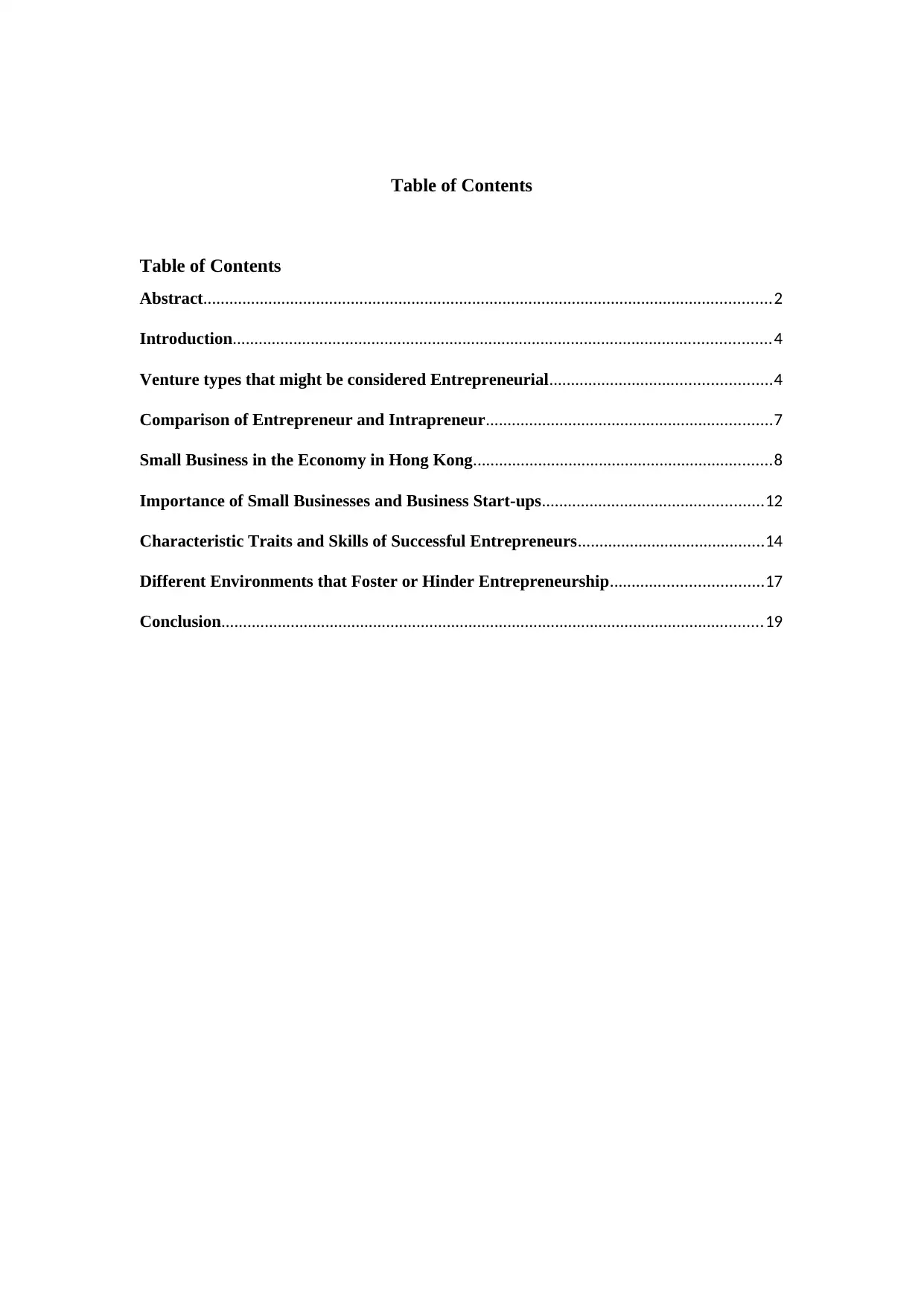
Table of Contents
Table of Contents
Abstract...................................................................................................................................2
Introduction............................................................................................................................4
Venture types that might be considered Entrepreneurial...................................................4
Comparison of Entrepreneur and Intrapreneur..................................................................7
Small Business in the Economy in Hong Kong.....................................................................8
Importance of Small Businesses and Business Start-ups...................................................12
Characteristic Traits and Skills of Successful Entrepreneurs...........................................14
Different Environments that Foster or Hinder Entrepreneurship...................................17
Conclusion.............................................................................................................................19
Table of Contents
Abstract...................................................................................................................................2
Introduction............................................................................................................................4
Venture types that might be considered Entrepreneurial...................................................4
Comparison of Entrepreneur and Intrapreneur..................................................................7
Small Business in the Economy in Hong Kong.....................................................................8
Importance of Small Businesses and Business Start-ups...................................................12
Characteristic Traits and Skills of Successful Entrepreneurs...........................................14
Different Environments that Foster or Hinder Entrepreneurship...................................17
Conclusion.............................................................................................................................19
⊘ This is a preview!⊘
Do you want full access?
Subscribe today to unlock all pages.

Trusted by 1+ million students worldwide
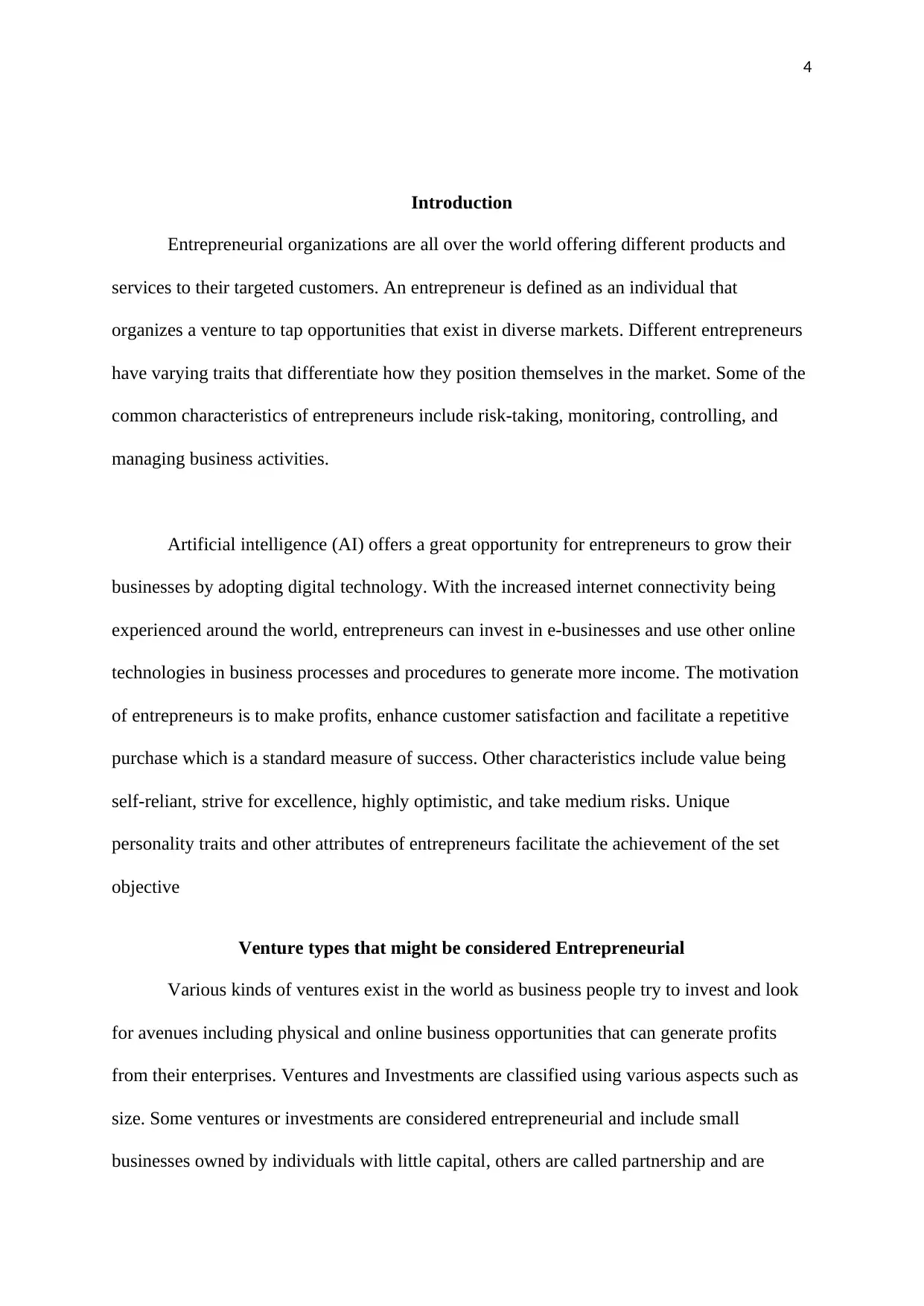
4
Introduction
Entrepreneurial organizations are all over the world offering different products and
services to their targeted customers. An entrepreneur is defined as an individual that
organizes a venture to tap opportunities that exist in diverse markets. Different entrepreneurs
have varying traits that differentiate how they position themselves in the market. Some of the
common characteristics of entrepreneurs include risk-taking, monitoring, controlling, and
managing business activities.
Artificial intelligence (AI) offers a great opportunity for entrepreneurs to grow their
businesses by adopting digital technology. With the increased internet connectivity being
experienced around the world, entrepreneurs can invest in e-businesses and use other online
technologies in business processes and procedures to generate more income. The motivation
of entrepreneurs is to make profits, enhance customer satisfaction and facilitate a repetitive
purchase which is a standard measure of success. Other characteristics include value being
self-reliant, strive for excellence, highly optimistic, and take medium risks. Unique
personality traits and other attributes of entrepreneurs facilitate the achievement of the set
objective
Venture types that might be considered Entrepreneurial
Various kinds of ventures exist in the world as business people try to invest and look
for avenues including physical and online business opportunities that can generate profits
from their enterprises. Ventures and Investments are classified using various aspects such as
size. Some ventures or investments are considered entrepreneurial and include small
businesses owned by individuals with little capital, others are called partnership and are
Introduction
Entrepreneurial organizations are all over the world offering different products and
services to their targeted customers. An entrepreneur is defined as an individual that
organizes a venture to tap opportunities that exist in diverse markets. Different entrepreneurs
have varying traits that differentiate how they position themselves in the market. Some of the
common characteristics of entrepreneurs include risk-taking, monitoring, controlling, and
managing business activities.
Artificial intelligence (AI) offers a great opportunity for entrepreneurs to grow their
businesses by adopting digital technology. With the increased internet connectivity being
experienced around the world, entrepreneurs can invest in e-businesses and use other online
technologies in business processes and procedures to generate more income. The motivation
of entrepreneurs is to make profits, enhance customer satisfaction and facilitate a repetitive
purchase which is a standard measure of success. Other characteristics include value being
self-reliant, strive for excellence, highly optimistic, and take medium risks. Unique
personality traits and other attributes of entrepreneurs facilitate the achievement of the set
objective
Venture types that might be considered Entrepreneurial
Various kinds of ventures exist in the world as business people try to invest and look
for avenues including physical and online business opportunities that can generate profits
from their enterprises. Ventures and Investments are classified using various aspects such as
size. Some ventures or investments are considered entrepreneurial and include small
businesses owned by individuals with little capital, others are called partnership and are
Paraphrase This Document
Need a fresh take? Get an instant paraphrase of this document with our AI Paraphraser
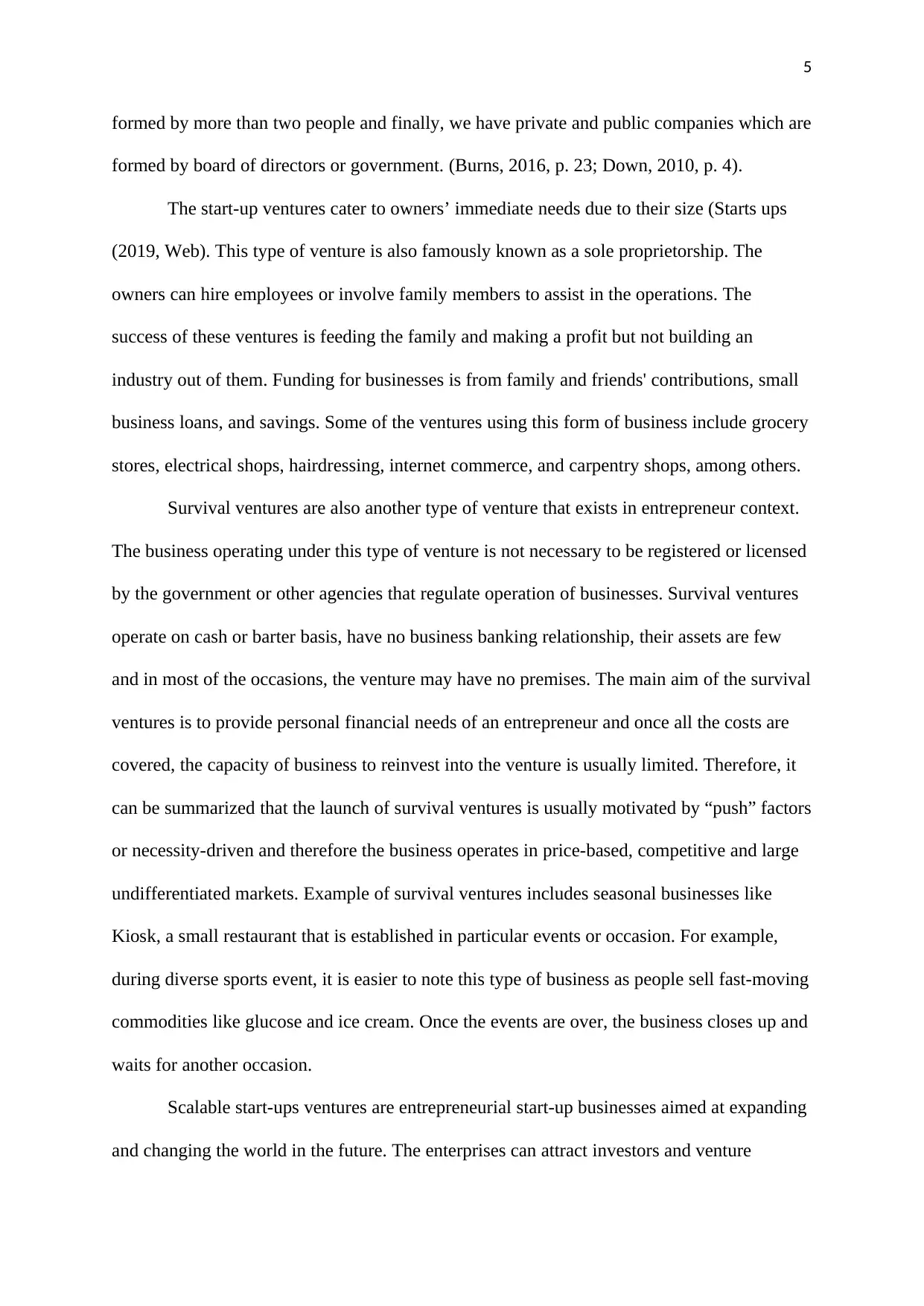
5
formed by more than two people and finally, we have private and public companies which are
formed by board of directors or government. (Burns, 2016, p. 23; Down, 2010, p. 4).
The start-up ventures cater to owners’ immediate needs due to their size (Starts ups
(2019, Web). This type of venture is also famously known as a sole proprietorship. The
owners can hire employees or involve family members to assist in the operations. The
success of these ventures is feeding the family and making a profit but not building an
industry out of them. Funding for businesses is from family and friends' contributions, small
business loans, and savings. Some of the ventures using this form of business include grocery
stores, electrical shops, hairdressing, internet commerce, and carpentry shops, among others.
Survival ventures are also another type of venture that exists in entrepreneur context.
The business operating under this type of venture is not necessary to be registered or licensed
by the government or other agencies that regulate operation of businesses. Survival ventures
operate on cash or barter basis, have no business banking relationship, their assets are few
and in most of the occasions, the venture may have no premises. The main aim of the survival
ventures is to provide personal financial needs of an entrepreneur and once all the costs are
covered, the capacity of business to reinvest into the venture is usually limited. Therefore, it
can be summarized that the launch of survival ventures is usually motivated by “push” factors
or necessity-driven and therefore the business operates in price-based, competitive and large
undifferentiated markets. Example of survival ventures includes seasonal businesses like
Kiosk, a small restaurant that is established in particular events or occasion. For example,
during diverse sports event, it is easier to note this type of business as people sell fast-moving
commodities like glucose and ice cream. Once the events are over, the business closes up and
waits for another occasion.
Scalable start-ups ventures are entrepreneurial start-up businesses aimed at expanding
and changing the world in the future. The enterprises can attract investors and venture
formed by more than two people and finally, we have private and public companies which are
formed by board of directors or government. (Burns, 2016, p. 23; Down, 2010, p. 4).
The start-up ventures cater to owners’ immediate needs due to their size (Starts ups
(2019, Web). This type of venture is also famously known as a sole proprietorship. The
owners can hire employees or involve family members to assist in the operations. The
success of these ventures is feeding the family and making a profit but not building an
industry out of them. Funding for businesses is from family and friends' contributions, small
business loans, and savings. Some of the ventures using this form of business include grocery
stores, electrical shops, hairdressing, internet commerce, and carpentry shops, among others.
Survival ventures are also another type of venture that exists in entrepreneur context.
The business operating under this type of venture is not necessary to be registered or licensed
by the government or other agencies that regulate operation of businesses. Survival ventures
operate on cash or barter basis, have no business banking relationship, their assets are few
and in most of the occasions, the venture may have no premises. The main aim of the survival
ventures is to provide personal financial needs of an entrepreneur and once all the costs are
covered, the capacity of business to reinvest into the venture is usually limited. Therefore, it
can be summarized that the launch of survival ventures is usually motivated by “push” factors
or necessity-driven and therefore the business operates in price-based, competitive and large
undifferentiated markets. Example of survival ventures includes seasonal businesses like
Kiosk, a small restaurant that is established in particular events or occasion. For example,
during diverse sports event, it is easier to note this type of business as people sell fast-moving
commodities like glucose and ice cream. Once the events are over, the business closes up and
waits for another occasion.
Scalable start-ups ventures are entrepreneurial start-up businesses aimed at expanding
and changing the world in the future. The enterprises can attract investors and venture
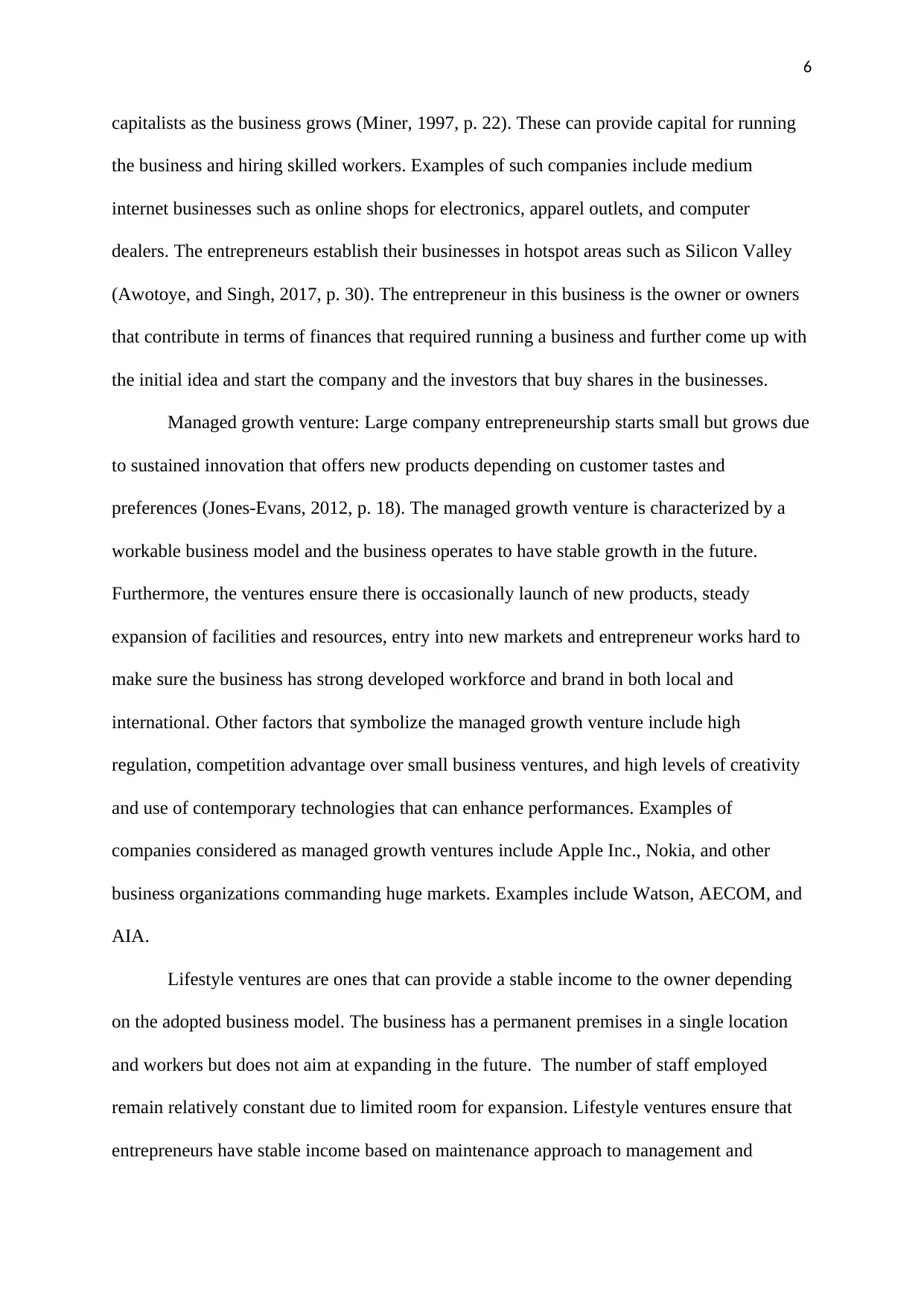
6
capitalists as the business grows (Miner, 1997, p. 22). These can provide capital for running
the business and hiring skilled workers. Examples of such companies include medium
internet businesses such as online shops for electronics, apparel outlets, and computer
dealers. The entrepreneurs establish their businesses in hotspot areas such as Silicon Valley
(Awotoye, and Singh, 2017, p. 30). The entrepreneur in this business is the owner or owners
that contribute in terms of finances that required running a business and further come up with
the initial idea and start the company and the investors that buy shares in the businesses.
Managed growth venture: Large company entrepreneurship starts small but grows due
to sustained innovation that offers new products depending on customer tastes and
preferences (Jones-Evans, 2012, p. 18). The managed growth venture is characterized by a
workable business model and the business operates to have stable growth in the future.
Furthermore, the ventures ensure there is occasionally launch of new products, steady
expansion of facilities and resources, entry into new markets and entrepreneur works hard to
make sure the business has strong developed workforce and brand in both local and
international. Other factors that symbolize the managed growth venture include high
regulation, competition advantage over small business ventures, and high levels of creativity
and use of contemporary technologies that can enhance performances. Examples of
companies considered as managed growth ventures include Apple Inc., Nokia, and other
business organizations commanding huge markets. Examples include Watson, AECOM, and
AIA.
Lifestyle ventures are ones that can provide a stable income to the owner depending
on the adopted business model. The business has a permanent premises in a single location
and workers but does not aim at expanding in the future. The number of staff employed
remain relatively constant due to limited room for expansion. Lifestyle ventures ensure that
entrepreneurs have stable income based on maintenance approach to management and
capitalists as the business grows (Miner, 1997, p. 22). These can provide capital for running
the business and hiring skilled workers. Examples of such companies include medium
internet businesses such as online shops for electronics, apparel outlets, and computer
dealers. The entrepreneurs establish their businesses in hotspot areas such as Silicon Valley
(Awotoye, and Singh, 2017, p. 30). The entrepreneur in this business is the owner or owners
that contribute in terms of finances that required running a business and further come up with
the initial idea and start the company and the investors that buy shares in the businesses.
Managed growth venture: Large company entrepreneurship starts small but grows due
to sustained innovation that offers new products depending on customer tastes and
preferences (Jones-Evans, 2012, p. 18). The managed growth venture is characterized by a
workable business model and the business operates to have stable growth in the future.
Furthermore, the ventures ensure there is occasionally launch of new products, steady
expansion of facilities and resources, entry into new markets and entrepreneur works hard to
make sure the business has strong developed workforce and brand in both local and
international. Other factors that symbolize the managed growth venture include high
regulation, competition advantage over small business ventures, and high levels of creativity
and use of contemporary technologies that can enhance performances. Examples of
companies considered as managed growth ventures include Apple Inc., Nokia, and other
business organizations commanding huge markets. Examples include Watson, AECOM, and
AIA.
Lifestyle ventures are ones that can provide a stable income to the owner depending
on the adopted business model. The business has a permanent premises in a single location
and workers but does not aim at expanding in the future. The number of staff employed
remain relatively constant due to limited room for expansion. Lifestyle ventures ensure that
entrepreneurs have stable income based on maintenance approach to management and
⊘ This is a preview!⊘
Do you want full access?
Subscribe today to unlock all pages.

Trusted by 1+ million students worldwide
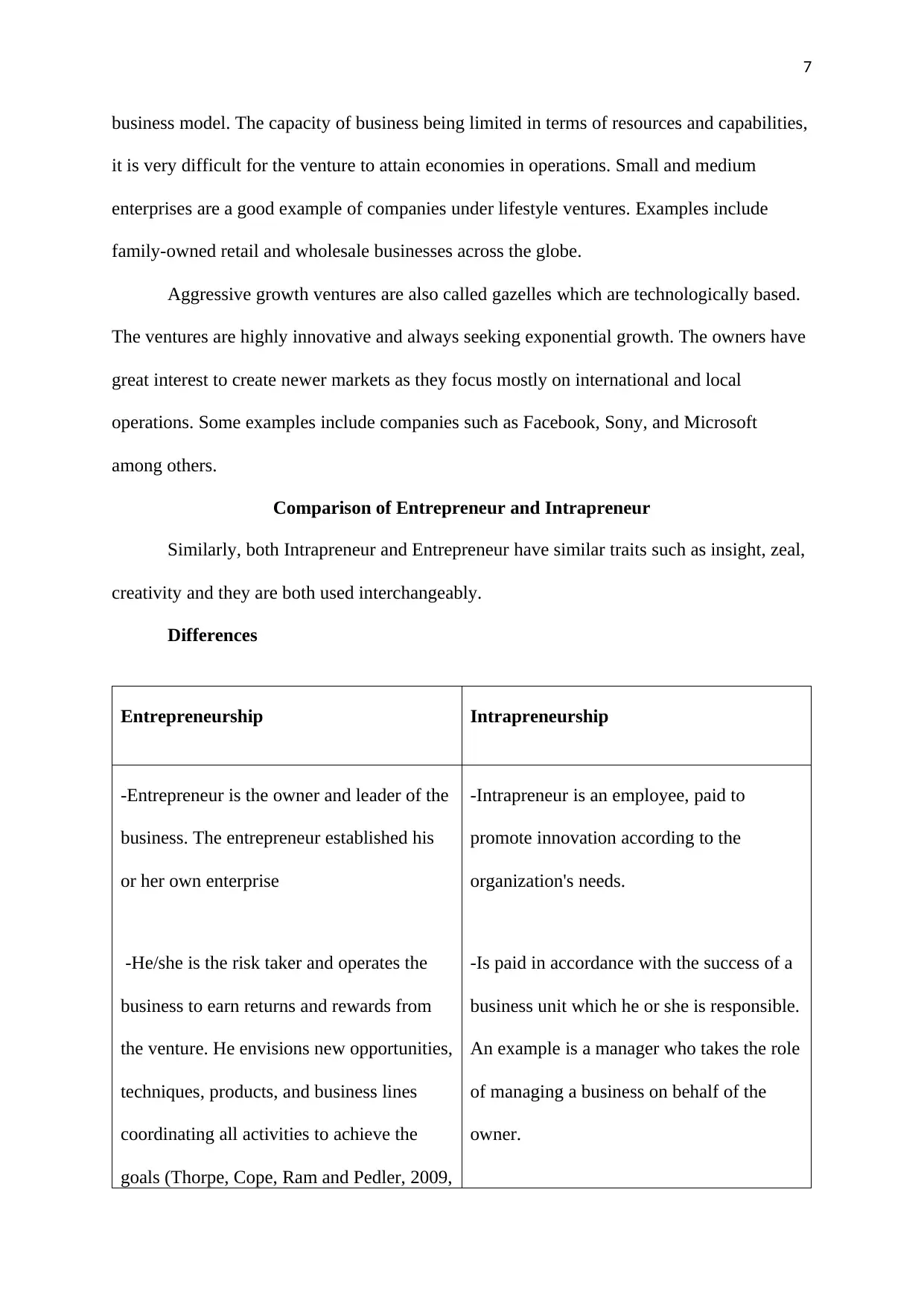
7
business model. The capacity of business being limited in terms of resources and capabilities,
it is very difficult for the venture to attain economies in operations. Small and medium
enterprises are a good example of companies under lifestyle ventures. Examples include
family-owned retail and wholesale businesses across the globe.
Aggressive growth ventures are also called gazelles which are technologically based.
The ventures are highly innovative and always seeking exponential growth. The owners have
great interest to create newer markets as they focus mostly on international and local
operations. Some examples include companies such as Facebook, Sony, and Microsoft
among others.
Comparison of Entrepreneur and Intrapreneur
Similarly, both Intrapreneur and Entrepreneur have similar traits such as insight, zeal,
creativity and they are both used interchangeably.
Differences
Entrepreneurship Intrapreneurship
-Entrepreneur is the owner and leader of the
business. The entrepreneur established his
or her own enterprise
-He/she is the risk taker and operates the
business to earn returns and rewards from
the venture. He envisions new opportunities,
techniques, products, and business lines
coordinating all activities to achieve the
goals (Thorpe, Cope, Ram and Pedler, 2009,
-Intrapreneur is an employee, paid to
promote innovation according to the
organization's needs.
-Is paid in accordance with the success of a
business unit which he or she is responsible.
An example is a manager who takes the role
of managing a business on behalf of the
owner.
business model. The capacity of business being limited in terms of resources and capabilities,
it is very difficult for the venture to attain economies in operations. Small and medium
enterprises are a good example of companies under lifestyle ventures. Examples include
family-owned retail and wholesale businesses across the globe.
Aggressive growth ventures are also called gazelles which are technologically based.
The ventures are highly innovative and always seeking exponential growth. The owners have
great interest to create newer markets as they focus mostly on international and local
operations. Some examples include companies such as Facebook, Sony, and Microsoft
among others.
Comparison of Entrepreneur and Intrapreneur
Similarly, both Intrapreneur and Entrepreneur have similar traits such as insight, zeal,
creativity and they are both used interchangeably.
Differences
Entrepreneurship Intrapreneurship
-Entrepreneur is the owner and leader of the
business. The entrepreneur established his
or her own enterprise
-He/she is the risk taker and operates the
business to earn returns and rewards from
the venture. He envisions new opportunities,
techniques, products, and business lines
coordinating all activities to achieve the
goals (Thorpe, Cope, Ram and Pedler, 2009,
-Intrapreneur is an employee, paid to
promote innovation according to the
organization's needs.
-Is paid in accordance with the success of a
business unit which he or she is responsible.
An example is a manager who takes the role
of managing a business on behalf of the
owner.
Paraphrase This Document
Need a fresh take? Get an instant paraphrase of this document with our AI Paraphraser
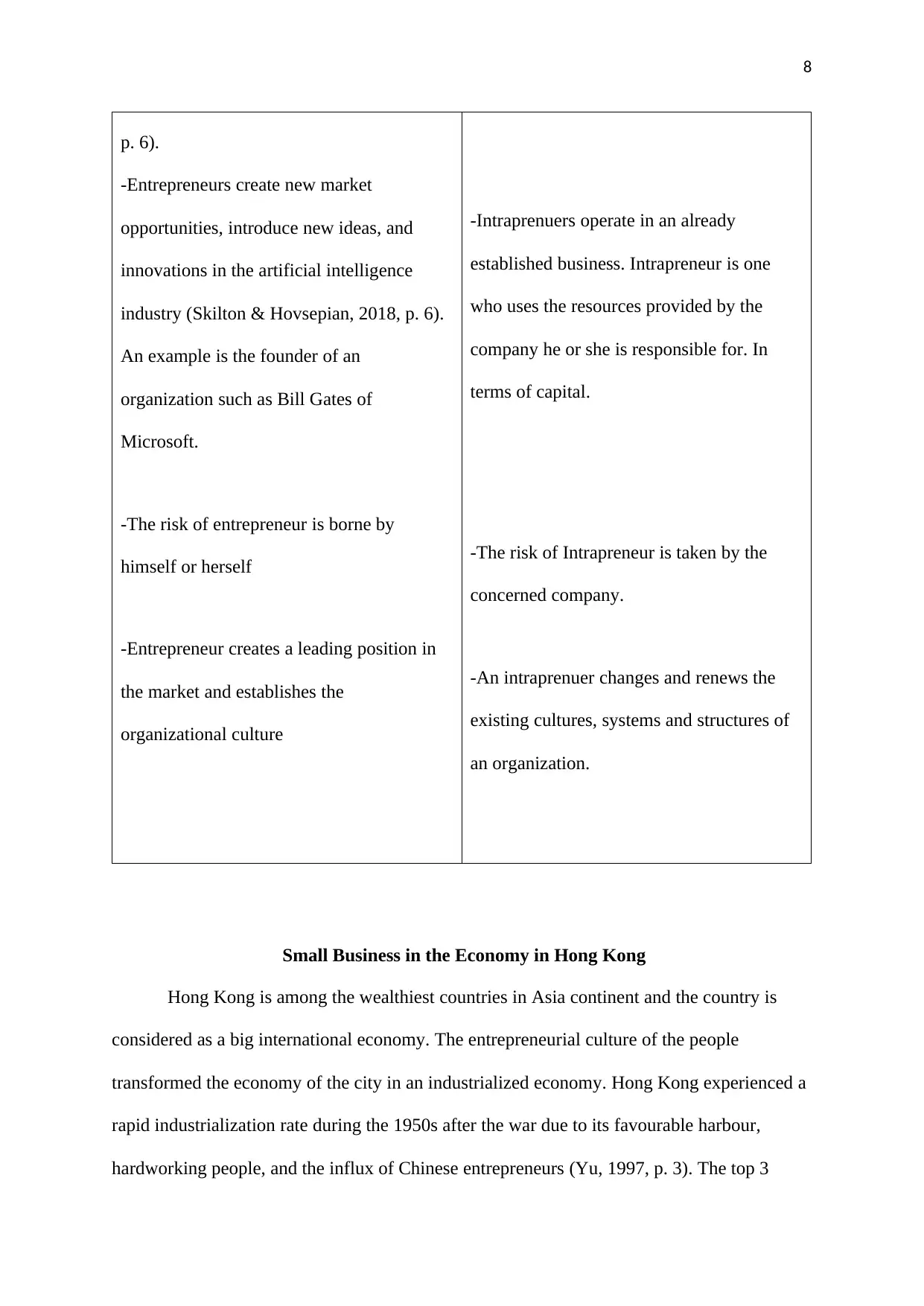
8
p. 6).
-Entrepreneurs create new market
opportunities, introduce new ideas, and
innovations in the artificial intelligence
industry (Skilton & Hovsepian, 2018, p. 6).
An example is the founder of an
organization such as Bill Gates of
Microsoft.
-The risk of entrepreneur is borne by
himself or herself
-Entrepreneur creates a leading position in
the market and establishes the
organizational culture
-Intraprenuers operate in an already
established business. Intrapreneur is one
who uses the resources provided by the
company he or she is responsible for. In
terms of capital.
-The risk of Intrapreneur is taken by the
concerned company.
-An intraprenuer changes and renews the
existing cultures, systems and structures of
an organization.
Small Business in the Economy in Hong Kong
Hong Kong is among the wealthiest countries in Asia continent and the country is
considered as a big international economy. The entrepreneurial culture of the people
transformed the economy of the city in an industrialized economy. Hong Kong experienced a
rapid industrialization rate during the 1950s after the war due to its favourable harbour,
hardworking people, and the influx of Chinese entrepreneurs (Yu, 1997, p. 3). The top 3
p. 6).
-Entrepreneurs create new market
opportunities, introduce new ideas, and
innovations in the artificial intelligence
industry (Skilton & Hovsepian, 2018, p. 6).
An example is the founder of an
organization such as Bill Gates of
Microsoft.
-The risk of entrepreneur is borne by
himself or herself
-Entrepreneur creates a leading position in
the market and establishes the
organizational culture
-Intraprenuers operate in an already
established business. Intrapreneur is one
who uses the resources provided by the
company he or she is responsible for. In
terms of capital.
-The risk of Intrapreneur is taken by the
concerned company.
-An intraprenuer changes and renews the
existing cultures, systems and structures of
an organization.
Small Business in the Economy in Hong Kong
Hong Kong is among the wealthiest countries in Asia continent and the country is
considered as a big international economy. The entrepreneurial culture of the people
transformed the economy of the city in an industrialized economy. Hong Kong experienced a
rapid industrialization rate during the 1950s after the war due to its favourable harbour,
hardworking people, and the influx of Chinese entrepreneurs (Yu, 1997, p. 3). The top 3
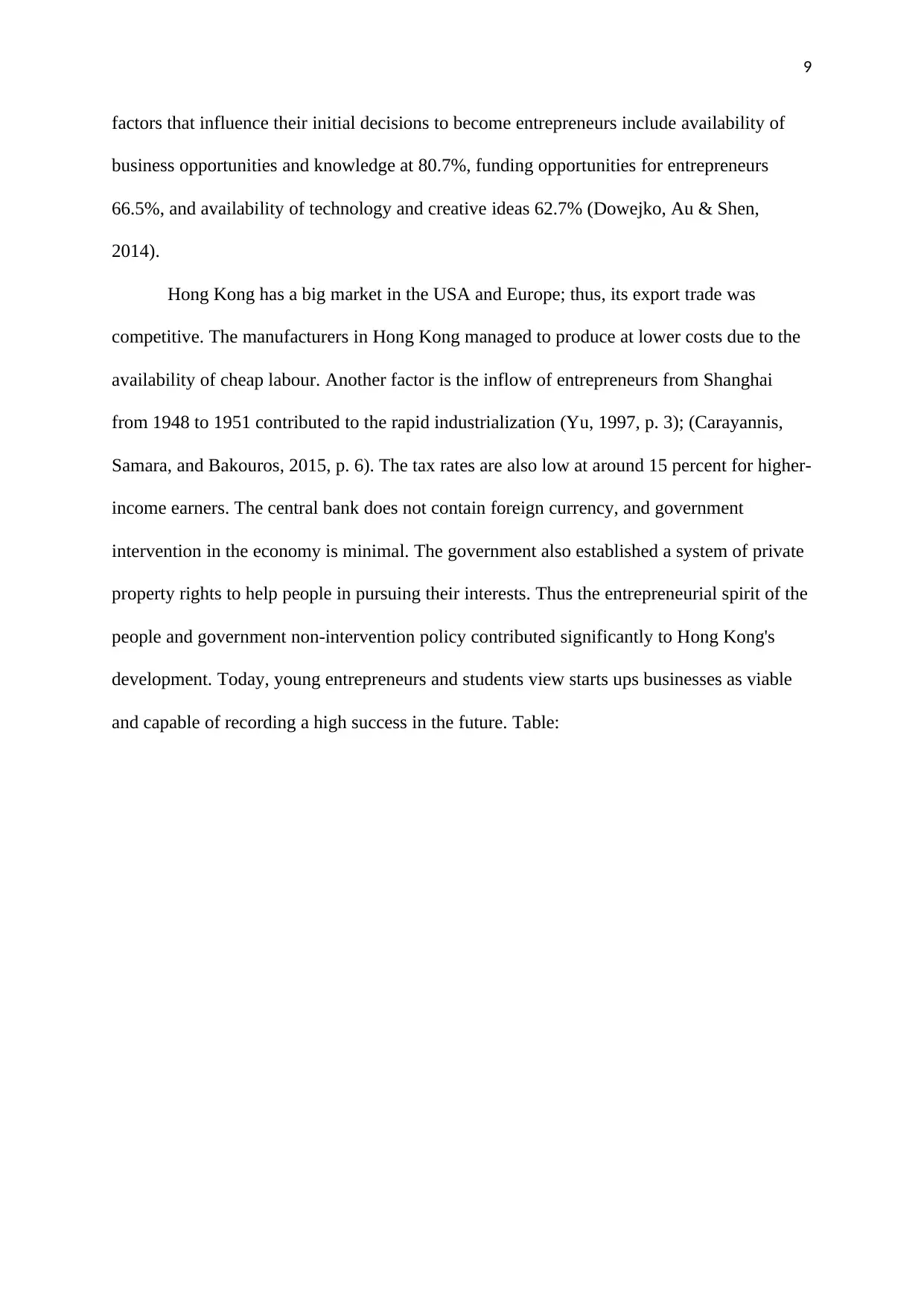
9
factors that influence their initial decisions to become entrepreneurs include availability of
business opportunities and knowledge at 80.7%, funding opportunities for entrepreneurs
66.5%, and availability of technology and creative ideas 62.7% (Dowejko, Au & Shen,
2014).
Hong Kong has a big market in the USA and Europe; thus, its export trade was
competitive. The manufacturers in Hong Kong managed to produce at lower costs due to the
availability of cheap labour. Another factor is the inflow of entrepreneurs from Shanghai
from 1948 to 1951 contributed to the rapid industrialization (Yu, 1997, p. 3); (Carayannis,
Samara, and Bakouros, 2015, p. 6). The tax rates are also low at around 15 percent for higher-
income earners. The central bank does not contain foreign currency, and government
intervention in the economy is minimal. The government also established a system of private
property rights to help people in pursuing their interests. Thus the entrepreneurial spirit of the
people and government non-intervention policy contributed significantly to Hong Kong's
development. Today, young entrepreneurs and students view starts ups businesses as viable
and capable of recording a high success in the future. Table:
factors that influence their initial decisions to become entrepreneurs include availability of
business opportunities and knowledge at 80.7%, funding opportunities for entrepreneurs
66.5%, and availability of technology and creative ideas 62.7% (Dowejko, Au & Shen,
2014).
Hong Kong has a big market in the USA and Europe; thus, its export trade was
competitive. The manufacturers in Hong Kong managed to produce at lower costs due to the
availability of cheap labour. Another factor is the inflow of entrepreneurs from Shanghai
from 1948 to 1951 contributed to the rapid industrialization (Yu, 1997, p. 3); (Carayannis,
Samara, and Bakouros, 2015, p. 6). The tax rates are also low at around 15 percent for higher-
income earners. The central bank does not contain foreign currency, and government
intervention in the economy is minimal. The government also established a system of private
property rights to help people in pursuing their interests. Thus the entrepreneurial spirit of the
people and government non-intervention policy contributed significantly to Hong Kong's
development. Today, young entrepreneurs and students view starts ups businesses as viable
and capable of recording a high success in the future. Table:
⊘ This is a preview!⊘
Do you want full access?
Subscribe today to unlock all pages.

Trusted by 1+ million students worldwide
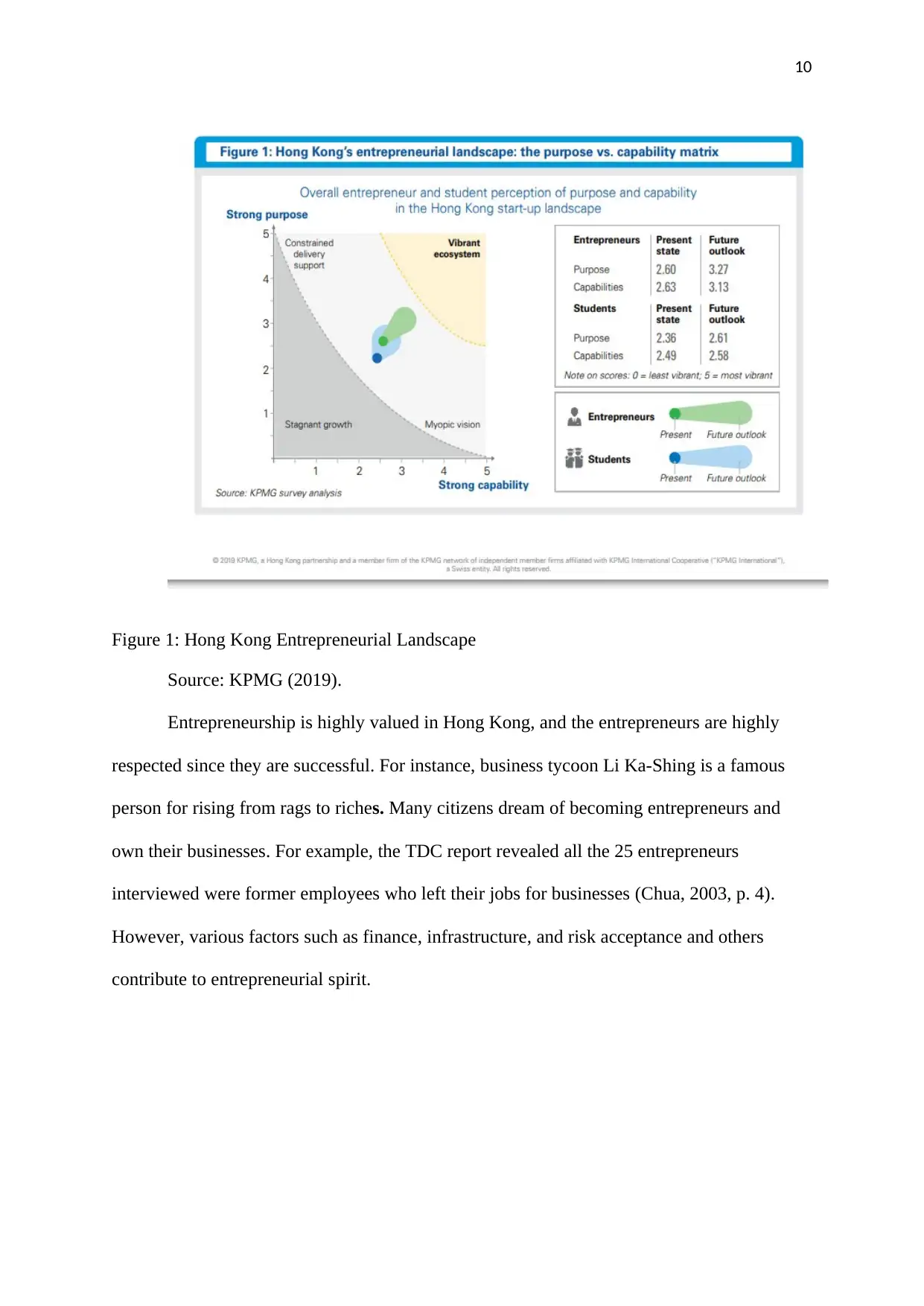
10
Figure 1: Hong Kong Entrepreneurial Landscape
Source: KPMG (2019).
Entrepreneurship is highly valued in Hong Kong, and the entrepreneurs are highly
respected since they are successful. For instance, business tycoon Li Ka-Shing is a famous
person for rising from rags to riches. Many citizens dream of becoming entrepreneurs and
own their businesses. For example, the TDC report revealed all the 25 entrepreneurs
interviewed were former employees who left their jobs for businesses (Chua, 2003, p. 4).
However, various factors such as finance, infrastructure, and risk acceptance and others
contribute to entrepreneurial spirit.
Figure 1: Hong Kong Entrepreneurial Landscape
Source: KPMG (2019).
Entrepreneurship is highly valued in Hong Kong, and the entrepreneurs are highly
respected since they are successful. For instance, business tycoon Li Ka-Shing is a famous
person for rising from rags to riches. Many citizens dream of becoming entrepreneurs and
own their businesses. For example, the TDC report revealed all the 25 entrepreneurs
interviewed were former employees who left their jobs for businesses (Chua, 2003, p. 4).
However, various factors such as finance, infrastructure, and risk acceptance and others
contribute to entrepreneurial spirit.
Paraphrase This Document
Need a fresh take? Get an instant paraphrase of this document with our AI Paraphraser
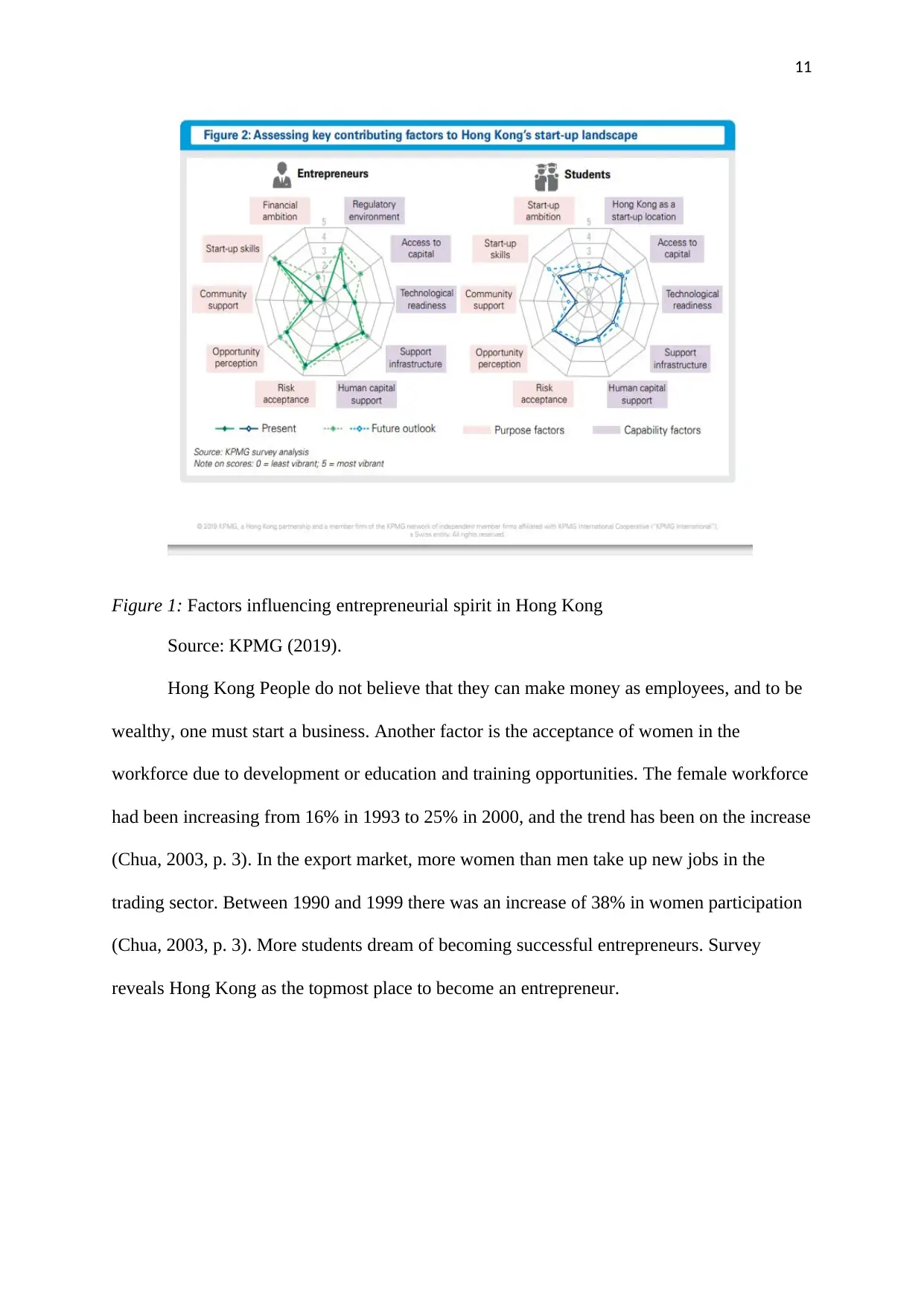
11
Figure 1: Factors influencing entrepreneurial spirit in Hong Kong
Source: KPMG (2019).
Hong Kong People do not believe that they can make money as employees, and to be
wealthy, one must start a business. Another factor is the acceptance of women in the
workforce due to development or education and training opportunities. The female workforce
had been increasing from 16% in 1993 to 25% in 2000, and the trend has been on the increase
(Chua, 2003, p. 3). In the export market, more women than men take up new jobs in the
trading sector. Between 1990 and 1999 there was an increase of 38% in women participation
(Chua, 2003, p. 3). More students dream of becoming successful entrepreneurs. Survey
reveals Hong Kong as the topmost place to become an entrepreneur.
Figure 1: Factors influencing entrepreneurial spirit in Hong Kong
Source: KPMG (2019).
Hong Kong People do not believe that they can make money as employees, and to be
wealthy, one must start a business. Another factor is the acceptance of women in the
workforce due to development or education and training opportunities. The female workforce
had been increasing from 16% in 1993 to 25% in 2000, and the trend has been on the increase
(Chua, 2003, p. 3). In the export market, more women than men take up new jobs in the
trading sector. Between 1990 and 1999 there was an increase of 38% in women participation
(Chua, 2003, p. 3). More students dream of becoming successful entrepreneurs. Survey
reveals Hong Kong as the topmost place to become an entrepreneur.
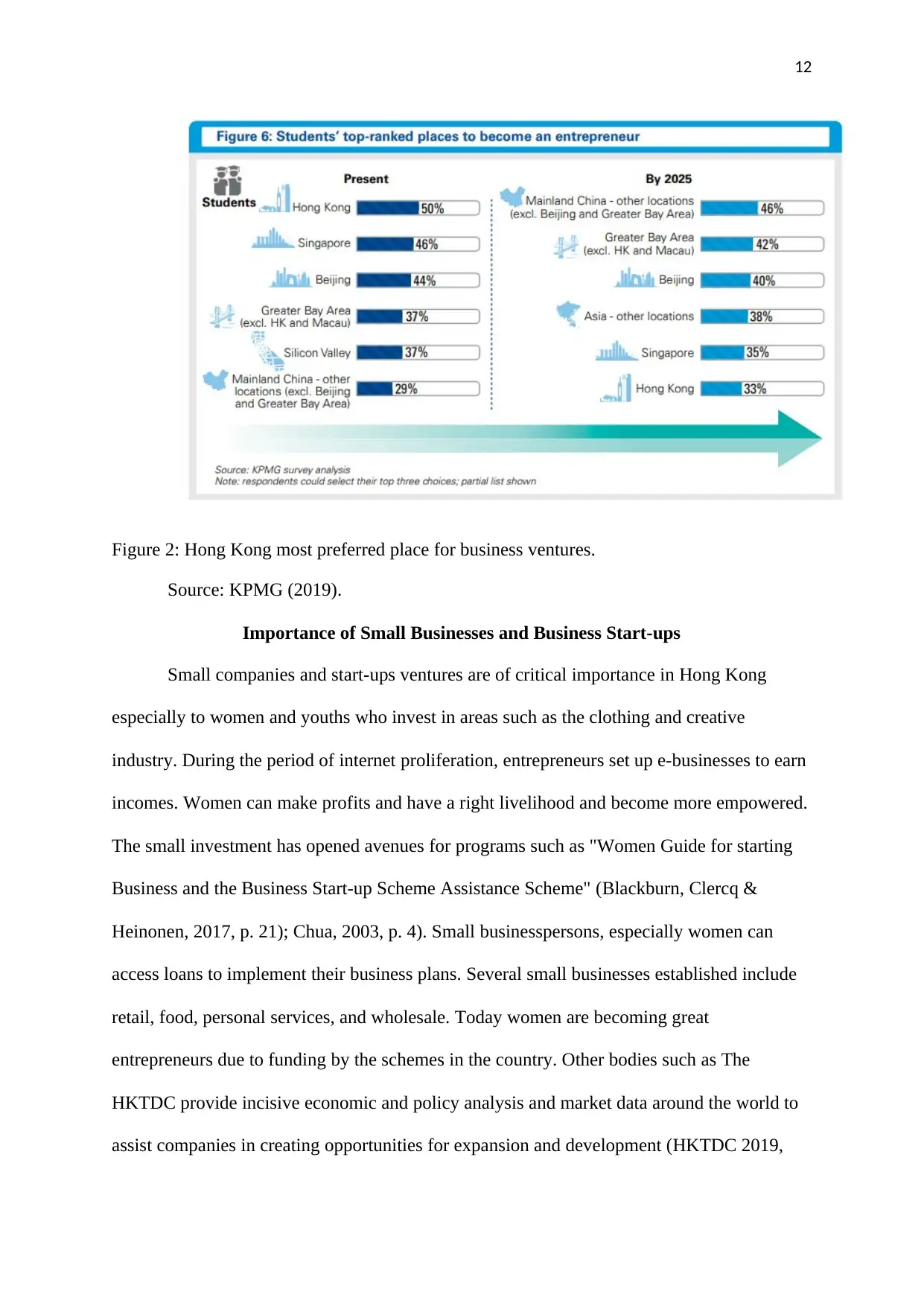
12
Figure 2: Hong Kong most preferred place for business ventures.
Source: KPMG (2019).
Importance of Small Businesses and Business Start-ups
Small companies and start-ups ventures are of critical importance in Hong Kong
especially to women and youths who invest in areas such as the clothing and creative
industry. During the period of internet proliferation, entrepreneurs set up e-businesses to earn
incomes. Women can make profits and have a right livelihood and become more empowered.
The small investment has opened avenues for programs such as "Women Guide for starting
Business and the Business Start-up Scheme Assistance Scheme" (Blackburn, Clercq &
Heinonen, 2017, p. 21); Chua, 2003, p. 4). Small businesspersons, especially women can
access loans to implement their business plans. Several small businesses established include
retail, food, personal services, and wholesale. Today women are becoming great
entrepreneurs due to funding by the schemes in the country. Other bodies such as The
HKTDC provide incisive economic and policy analysis and market data around the world to
assist companies in creating opportunities for expansion and development (HKTDC 2019,
Figure 2: Hong Kong most preferred place for business ventures.
Source: KPMG (2019).
Importance of Small Businesses and Business Start-ups
Small companies and start-ups ventures are of critical importance in Hong Kong
especially to women and youths who invest in areas such as the clothing and creative
industry. During the period of internet proliferation, entrepreneurs set up e-businesses to earn
incomes. Women can make profits and have a right livelihood and become more empowered.
The small investment has opened avenues for programs such as "Women Guide for starting
Business and the Business Start-up Scheme Assistance Scheme" (Blackburn, Clercq &
Heinonen, 2017, p. 21); Chua, 2003, p. 4). Small businesspersons, especially women can
access loans to implement their business plans. Several small businesses established include
retail, food, personal services, and wholesale. Today women are becoming great
entrepreneurs due to funding by the schemes in the country. Other bodies such as The
HKTDC provide incisive economic and policy analysis and market data around the world to
assist companies in creating opportunities for expansion and development (HKTDC 2019,
⊘ This is a preview!⊘
Do you want full access?
Subscribe today to unlock all pages.

Trusted by 1+ million students worldwide
1 out of 22
Related Documents
Your All-in-One AI-Powered Toolkit for Academic Success.
+13062052269
info@desklib.com
Available 24*7 on WhatsApp / Email
![[object Object]](/_next/static/media/star-bottom.7253800d.svg)
Unlock your academic potential
Copyright © 2020–2026 A2Z Services. All Rights Reserved. Developed and managed by ZUCOL.





